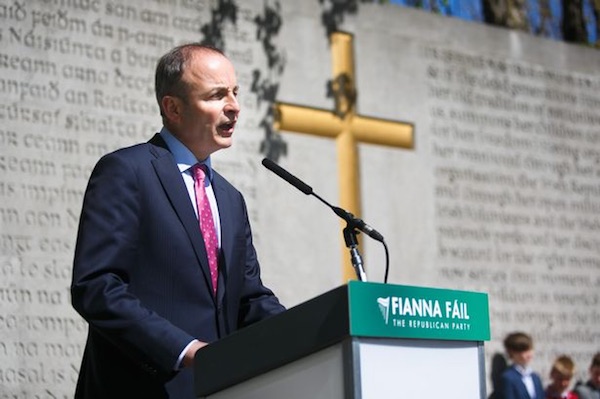
With just weeks to go before an election in the Six Counties, the Stormont Assembly has come under a surprise attack from Fianna Fail leader Micheal Martin, who urged the Dublin and London governments to directly intervene to end the “stranglehold” at Stormont.
He also called for a complete overhaul of the north-south bodies set up under the Good Friday Agreement.
Speaking at his party’s annual Easter Rising commemoration, Mr Martin attacked what he claimed was the damage being caused by Sinn Fein and the DUP to the new political institutions in the North. He was speaking amid signs of increasing disengagement among nationalist voters in the North.
“We need direct engagement by both the Irish and British governments to end the stranglehold in Stormont by two parties,” he said. “This is doing immense damage to public support for the institutions and public engagement in politics.”
Underlying the reports of voter disenchantment is that regardless of the result of the May 5 election, Executive Ministeries will again be shared out only among those parties which support the Stormont process, ensuring no change in political direction. The most powerful posts of First Minister and Deputy First Minister will also again be allocated to the DUP and Sinn Fein, as the largest parties in the unionist and nationalist communities respectively.
Mr Martin accused the DUP and Sinn Fein of pandering only to their own communities while failing to build bridges between them.
“This opportunity is being wasted,” he said during the 1916 commemoration at Dublin’s Arbour Hill.
He also condemned as “an outrage” that Sinn Fein has “sought to re-write history and claim direct continuity from 1916”.
Mr Martin added: “Provisional Sinn Fein was founded in 1970 to support a campaign rejected constantly by the mass of the Irish people in vote after vote for quarter of a century. The manner in which they have sought to rewrite history and claim direct continuity from 1916 is an outrage.”
Sinn Fein’s Gerry Adams hit back, accusing him of misrepresenting politics in the north. He said the remarks were evidence of “how far this Fianna Fail leader has departed from the principles and vision that marks the Good Friday Agreement”.
He also attacked Fianna Fail for posing as ‘the republican party’ while wielding power in the interests of the corrupt elite, as opposed to those of ordinary citizens. And he defended those republicans who fought in the recent conflict, who he said had shown the same ideals and courage as those of 1916.
“The Fianna Fail leadership may defend the actions of 1916 but they want republican history and the legitimacy of that revolutionary option to end there. For their own narrow party political interests there has to be a line drawn between Terence McSwiney and Bobby Sands; between Thomas Ashe and Francie Hughes; between Countess Markievicz and Mairead Farrell.”
DUP leader Arlene Foster also questioned Mr Martin’s grounds for criticising political leaders north of the border, while a government has still yet to be formed in Dublin in the wake of February’s general election.
“If it wasn’t so offensive it would probably be quite funny,” Mrs Foster said. “Here is a man who is part of a political jurisdiction that 53 days after a general election can’t form a government, yet he spends his time making comments about a different country. He really should concentrate on forming a government in his own country.”
Mrs Foster said the DUP and Sinn Fein led the last executive because they had secured the most votes at the last Assembly election. “It’s not up to Micheal Martin to tell the people of Northern Ireland how to elect their government,” she said.
Mr Adams’s full response to Mr Martin is included below.
![[Irish Republican News]](https://republican-news.org/graphics/title_gifs/rn.gif)
![[Irish Republican News]](https://republican-news.org/graphics/title_gifs/harp.gif)

